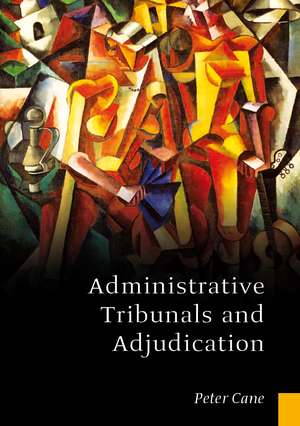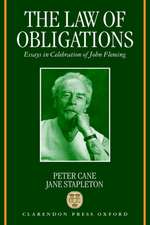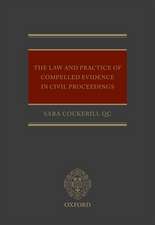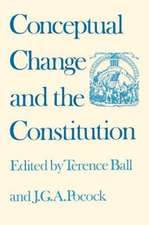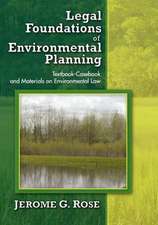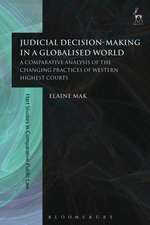Administrative Tribunals and Adjudication
Autor Professor Peter Caneen Limba Engleză Hardback – 2 aug 2009
| Toate formatele și edițiile | Preț | Express |
|---|---|---|
| Paperback (1) | 307.41 lei 6-8 săpt. | |
| Bloomsbury Publishing – 28 iun 2010 | 307.41 lei 6-8 săpt. | |
| Hardback (1) | 599.82 lei 6-8 săpt. | |
| Bloomsbury Publishing – 2 aug 2009 | 599.82 lei 6-8 săpt. |
Preț: 599.82 lei
Preț vechi: 697.47 lei
-14% Nou
Puncte Express: 900
Preț estimativ în valută:
114.77€ • 119.84$ • 94.78£
114.77€ • 119.84$ • 94.78£
Carte tipărită la comandă
Livrare economică 15-29 aprilie
Preluare comenzi: 021 569.72.76
Specificații
ISBN-13: 9781841130095
ISBN-10: 1841130095
Pagini: 312
Dimensiuni: 156 x 234 x 24 mm
Greutate: 0.6 kg
Editura: Bloomsbury Publishing
Colecția Hart Publishing
Locul publicării:London, United Kingdom
ISBN-10: 1841130095
Pagini: 312
Dimensiuni: 156 x 234 x 24 mm
Greutate: 0.6 kg
Editura: Bloomsbury Publishing
Colecția Hart Publishing
Locul publicării:London, United Kingdom
Caracteristici
This new book, by one of the world's leading administrative law experts, is the first modern work to examine administrative tribunals in all their aspects. Commencing with a history of these tribunals, the book goes on to examine in detail the different models employed in the UK, US, Australia and France. Further chapters review the wide range of form, function and purpose characterising tribunals in these jurisdictions. A final chapter offers conclusions and an assessment of their future role and significance.
Notă biografică
Peter Cane is Distinguished Professor of Law at the Australian National University College of Law. His other publications include Administrative Law 4th edn (Oxford, OUP, 2004) and (with Leighton McDonald) Principles of Administrative Law: Legal Regulation of Government (Melbourne, OUP, 2008). He is a Corresponding Fellow of the British Academy and a Fellow of the Academy of Social Sciences in Australia.
Cuprins
1 Survey1.1 The Project1.2 Administrative Tribunals and Administrative Adjudication 1.2.1 The AAT is not a court 1.2.2 The AAT reviews decisions 1.2.3 The AAT's jurisdiction 1.3 The Plan of the Book1.4 Conclusion 2 History2.1 Introduction2.2 1066 to 1800 2.3 19th and 20th Centuries 2.3.1 The UK2.3.2 The US 2.3.3 Australia 2.4 Conclusion 3 Models3.1 The UK Model3.2 The US Model3.3 The Australian Model 3.4 The French Model 3.5 Conclusion 4 Form4.1 Membership, Appointments and Composition4.1.1 Membership 4.1.1.1 Expertise and Specialisation 4.1.1.2 The US 4.1.1.3 The UK 4.1.1.4 Australia 4.1.1.5 The Tasks of Non-court Administrative Adjudicators 4.1.2 Appointment Processes4.1.3 Composition 4.2 Separation and Independence 4.2.1 The UK4.2.2 Australia 4.2.3 The US 4.3 Structure and Systematisation 4.3.1 Jurisdictional Specialisation 4.3.1.1 Patterns of Specialisation4.3.1.2 The Theory of Specialisation and Amalgamation4.3.2 Supervision and Accountability 4.3.2.1 Hierarchical Supervision4.3.2.2 External Supervision 4.4 Conclusion 5 Function 5.1 Introduction5.2 Categorising Governance Functions: the Legacy of Montesquieu 5.3 Merits Review 5.3.1 Merits Review is a Mode of Review5.3.2 The Substantive Element of Merits Review5.3.2.1 The 'Correct or Preferable' Formula5.3.2.2 The Basis of Merits Review5.3.3 The Procedural Element of Merits Review5.3.4 The Remedial Element of Merits Review 5.4 Merits Review and Judicial Review5.5 The 'Normative Function' of Merits Review and the AAT5.6 Merits Review Outside the AAT 5.7 The Nature of Tribunal Review in Comparator Jurisdictions5.7.1 The UK5.7.2 The US 5.8 Conclusion 6 Purpose6.1 What is Administrative Justice? 6.2 A Formula for Administrative Justice in Tribunals? 6.3 Jurisdiction6.4 Standing 6.5 Processes 6.5.1 The Paradigm Mode of Decision-Making 6.5.1.1 The Reviewer6.5.1.2 The Respondent 6.5.2 Alternatives to the Paradigm Mode 6.6 Resources6.7 Conclusion 7 Landscape7.1 The Accountability 'Sector' 7.2 Tribunals and Ombudsmen7.3 Tribunals and Internal Review7.4 Tribunals and Courts 7.4.1 Australia 7.4.2 The US 7.4.3 The UK7.4.4 Re-conceiving the Relationship Between Courts andTribunals 7.5 Tribunals and ADR/PDR 7.6 Conclusion
Recenzii
...the book provides a clear theoretical analysis of administrative tribunals in different jurisdictions.
Professor Cane's excellent book helps to redress the lack of academic attention paid to administrative tribunals.This is an outstanding account of Australian tribunal adjudication and its place in the regime of administrative decision-making and law. The detailed and sophisticated use of comparative law analysis helps to understand the choices that have been taken in Australia, what some of the alternatives were (and are), and also the constraints that will continue to shape administrative adjudication.
Cane presents a precise, richly detailed account of administrative organizations, grounded in an impressive survey of the administrative law literature and Cane's own observations ... Such a detailed account is valuable because, as Cane notes, there is not much literature outside of Australia about what administrative tribunals doReaders will come away impressed with the breadth of research that Cane has conducted on these tribunals and the care with which he details the differences among them.
While tribunals and merits review of administrative decisions may often be discussed in academic and practitioner literature, they are rarely the subject of theoretical, comparative, and historical examination. Peter Cane takes up this challenge in this book.Although it has its origins in debates about Australian administrative law, Professor Cane's book has a far broader scope and will be on interest to administrative lawyers in each of the countries examined. It achieves an impressive combination of broad historical and comparative analysis and fine assessment of the details and complexities of merits review. It develops significant insights, such as the distinction between implementation and adjudication, which highlight the substantive characteristics of merit review. It should become a primary reference for scholars researching accountability institutions.
Administrative Tribunals and Adjudication is a work of considerable scholarship, which throws new light on an important set of institutions that have not hitherto received the attention they deserve.
...this book tackles an area of great contemporary interest in the UK and does so with vigour and ability.
The book is clearly and elegantly structured into seven chapters each analysing a different aspect of tribunals.The strengths of this book are to be found principally in the subtle blend of different types of analysis - constitutional, historical and comparative - used to appreciate the role and significance of tribunals.Cane presents a very scholarly and well-informed synthesis of three dimensions of tribunals: their functions across four jurisdictions, their historical development, and their constitutional significance.This book is very much to be welcomed as an excellent addition to the literature. It provides a valuable and wide-ranging study of an important but long neglected set of institutions and it should encourage administrative law scholars to pay much more attention to the work of tribunals.
Professor Cane's excellent book helps to redress the lack of academic attention paid to administrative tribunals.This is an outstanding account of Australian tribunal adjudication and its place in the regime of administrative decision-making and law. The detailed and sophisticated use of comparative law analysis helps to understand the choices that have been taken in Australia, what some of the alternatives were (and are), and also the constraints that will continue to shape administrative adjudication.
Cane presents a precise, richly detailed account of administrative organizations, grounded in an impressive survey of the administrative law literature and Cane's own observations ... Such a detailed account is valuable because, as Cane notes, there is not much literature outside of Australia about what administrative tribunals doReaders will come away impressed with the breadth of research that Cane has conducted on these tribunals and the care with which he details the differences among them.
While tribunals and merits review of administrative decisions may often be discussed in academic and practitioner literature, they are rarely the subject of theoretical, comparative, and historical examination. Peter Cane takes up this challenge in this book.Although it has its origins in debates about Australian administrative law, Professor Cane's book has a far broader scope and will be on interest to administrative lawyers in each of the countries examined. It achieves an impressive combination of broad historical and comparative analysis and fine assessment of the details and complexities of merits review. It develops significant insights, such as the distinction between implementation and adjudication, which highlight the substantive characteristics of merit review. It should become a primary reference for scholars researching accountability institutions.
Administrative Tribunals and Adjudication is a work of considerable scholarship, which throws new light on an important set of institutions that have not hitherto received the attention they deserve.
...this book tackles an area of great contemporary interest in the UK and does so with vigour and ability.
The book is clearly and elegantly structured into seven chapters each analysing a different aspect of tribunals.The strengths of this book are to be found principally in the subtle blend of different types of analysis - constitutional, historical and comparative - used to appreciate the role and significance of tribunals.Cane presents a very scholarly and well-informed synthesis of three dimensions of tribunals: their functions across four jurisdictions, their historical development, and their constitutional significance.This book is very much to be welcomed as an excellent addition to the literature. It provides a valuable and wide-ranging study of an important but long neglected set of institutions and it should encourage administrative law scholars to pay much more attention to the work of tribunals.
Descriere
This book compares tribunals in three major jurisdictions, analyses 'administrative adjudication', and traces its historical development.
